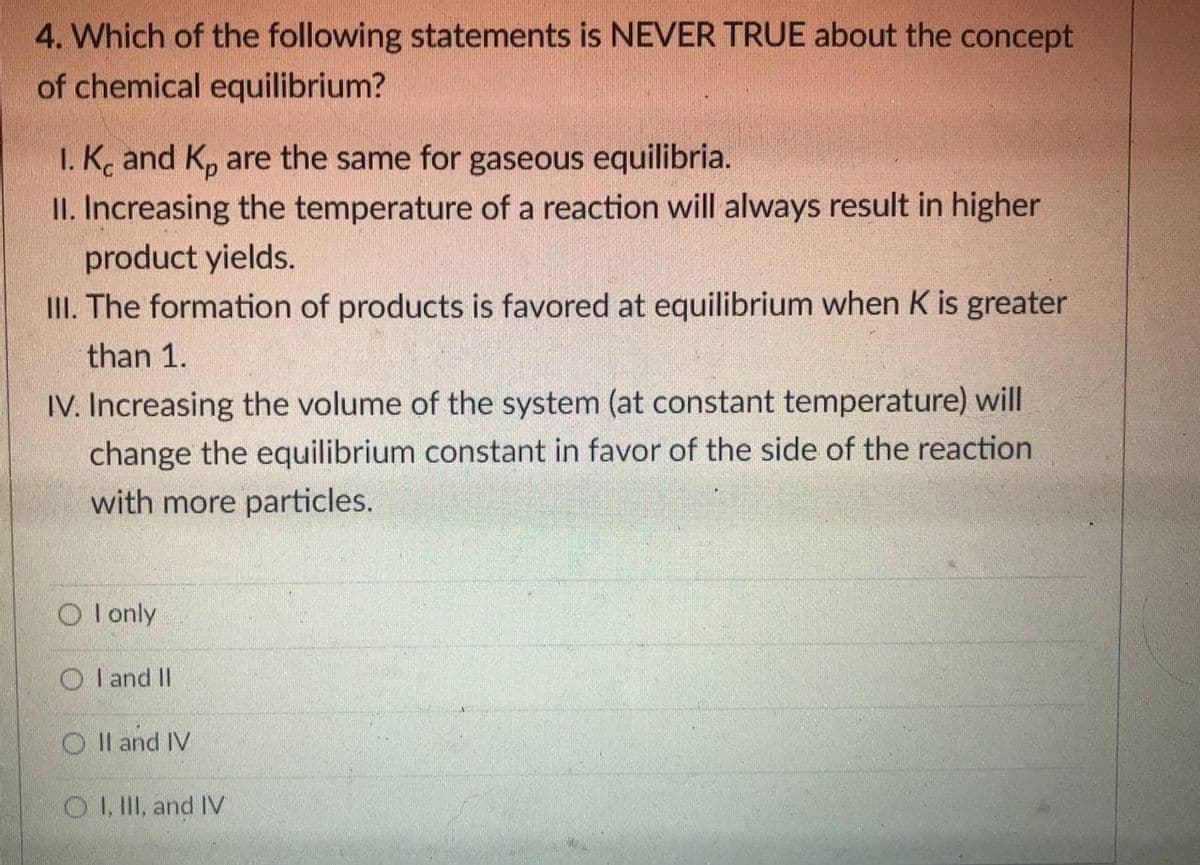4. Which of the following statements is NEVER TRUE about the concept of chemical equilibrium? I. K. and K, are the same for gaseous equilibria. II. Increasing the temperature of a reaction will always result in higher product yields. III. The formation of products is favored at equilibrium when K is greater than 1. IV. Increasing the volume of the system (at constant temperature) will change the equilibrium constant in favor of the side of the reaction with more particles. O l only O I and II Il and IV
4. Which of the following statements is NEVER TRUE about the concept of chemical equilibrium? I. K. and K, are the same for gaseous equilibria. II. Increasing the temperature of a reaction will always result in higher product yields. III. The formation of products is favored at equilibrium when K is greater than 1. IV. Increasing the volume of the system (at constant temperature) will change the equilibrium constant in favor of the side of the reaction with more particles. O l only O I and II Il and IV
World of Chemistry, 3rd edition
3rd Edition
ISBN:9781133109655
Author:Steven S. Zumdahl, Susan L. Zumdahl, Donald J. DeCoste
Publisher:Steven S. Zumdahl, Susan L. Zumdahl, Donald J. DeCoste
Chapter17: Equilibrium
Section: Chapter Questions
Problem 39A
Related questions
Question

Transcribed Image Text:4. Which of the following statements is NEVER TRUE about the concept
of chemical equilibrium?
I. K. and K, are the same for gaseous equilibria.
II. Increasing the temperature of a reaction will always result in higher
product yields.
III. The formation of products is favored at equilibrium when K is greater
than 1.
IV. Increasing the volume of the system (at constant temperature) will
change the equilibrium constant in favor of the side of the reaction
with more particles.
O I only
O I and II
O Il and IV
O I, II, and IV
Expert Solution
This question has been solved!
Explore an expertly crafted, step-by-step solution for a thorough understanding of key concepts.
Step by step
Solved in 4 steps

Knowledge Booster
Learn more about
Need a deep-dive on the concept behind this application? Look no further. Learn more about this topic, chemistry and related others by exploring similar questions and additional content below.Recommended textbooks for you

World of Chemistry, 3rd edition
Chemistry
ISBN:
9781133109655
Author:
Steven S. Zumdahl, Susan L. Zumdahl, Donald J. DeCoste
Publisher:
Brooks / Cole / Cengage Learning

Chemistry: Principles and Practice
Chemistry
ISBN:
9780534420123
Author:
Daniel L. Reger, Scott R. Goode, David W. Ball, Edward Mercer
Publisher:
Cengage Learning

Introductory Chemistry: A Foundation
Chemistry
ISBN:
9781337399425
Author:
Steven S. Zumdahl, Donald J. DeCoste
Publisher:
Cengage Learning

World of Chemistry, 3rd edition
Chemistry
ISBN:
9781133109655
Author:
Steven S. Zumdahl, Susan L. Zumdahl, Donald J. DeCoste
Publisher:
Brooks / Cole / Cengage Learning

Chemistry: Principles and Practice
Chemistry
ISBN:
9780534420123
Author:
Daniel L. Reger, Scott R. Goode, David W. Ball, Edward Mercer
Publisher:
Cengage Learning

Introductory Chemistry: A Foundation
Chemistry
ISBN:
9781337399425
Author:
Steven S. Zumdahl, Donald J. DeCoste
Publisher:
Cengage Learning

Chemistry for Engineering Students
Chemistry
ISBN:
9781337398909
Author:
Lawrence S. Brown, Tom Holme
Publisher:
Cengage Learning

Principles of Modern Chemistry
Chemistry
ISBN:
9781305079113
Author:
David W. Oxtoby, H. Pat Gillis, Laurie J. Butler
Publisher:
Cengage Learning
